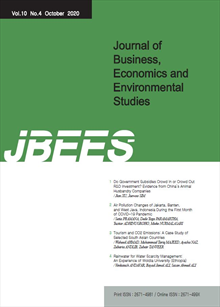간행물
The Journal of Business, Economics, and Environmental Studies KCI 등재

- 발행기관 한국유통과학회
- 자료유형 학술지
- 간기 계간
- ISSN 2671-4981 (Print)2671-499X (Online)
- 수록기간 2011 ~ 2020
- 주제분류 사회과학 > 경영학 사회과학 분류의 다른 간행물
- 십진분류KDC 325DDC 330
권호리스트/논문검색
Vol.10 No. 4 (2020년 10월) 4건
1.
2020.10
서비스 종료(열람 제한)
Purpose: The purpose of this paper is to empirically investigate the relationship between government subsidies and research and development (R&D) investment of animal husbandry companies in China. The moderating effects of firm size, debt ratio, and firm profitability on this relationship are also examined. Research design, data and methodology: The analysis is based on 14 animal husbandry companies listed on the Shanghai and Shenzhen stock exchanges over the period of 2012-2016. Data are obtained from the China Stock Market & Accounting Research (CSMAR) database and the RESSET database, and multiple regression analysis is utilized with the aid of Stata. Results: The empirical results show that government subsidies can promote R&D investment of animal husbandry companies in China. In addition, firm size, debt ratio, and firm profitability have positive moderating effects on the relationship between government subsidies and R&D investment. Conclusions: Based on the results, the paper concludes that government subsidies play an important role in the process of R&D of China’s animal husbandry companies. This paper recommends that managers of animal husbandry companies should enhance the utilization efficiency of government subsidies and put great emphasis on R&D investment. The policymakers should implement more incentives to encourage animal husbandry companies to invest more in R&D.
2.
2020.10
서비스 종료(열람 제한)
Purpose: This research aims to explore the level of air pollution in Jakarta, the epicenter of COVID-19 Pandemic in Indonesia and its surrounding provinces during the first month of the Pandemic. Research design, data and methodology: This study uses data, which have been obtained real time from API (Application Programming Interfaces) of air quality website. The measurements of Air Quality Index (AQI), temperature, humidity, and other factors from several cities and regencies in Indonesia were obtained eight times a day. The data collected have been analyzed using descriptive statistics and mapped using QGIS. Results: The finding of this study indicates that The Greater Jakarta Area experienced a decrease in pollutant levels, especially in the Bogor area. Nevertheless, some areas, such as the north Jakarta, have exhibited slow reduction. Furthermore, the regions with high COVID-19 confirmed cases have experienced a decline in AQI. Conclusions: The study concludes that the air quality of three provinces, Jakarta, Banten, and West Java, especially in cities located in the Jakarta Metropolitan Area during COVID-19 pandemic and large-scale social restrictions, is getting better. However, in some regions, the reduction of pollutant concentrations requires a longer time, as it was very high before the pandemic.
3.
2020.10
서비스 종료(열람 제한)
Purpose: The present study examines the effects of tourism on carbon dioxide emissions for selected South Asian economies over the time from 1995 to 2016. Research design, data and methodology: The present study is an annual time series analysis of tourism and CO2 emissions. The data is taken from World Development Indicators, an official data bank of World Bank. The study sample covers four South Asian countries, namely Bangladesh, India, Pakistan, Sri Lanka and Nepal. The empirical analysis is conducted by employing Pedroni panel cointegration, Fully Modified OLS, and Dynamic OLS approaches of estimation. Results: Tourism significantly increases environmental degradation in selected South Asian economies. The empirical estimated results indicate, that 1 % increase in tourism related activities leads to 0.16 % increase in CO2 emissions. In addition energy consumption and GDP are also causing an upsurge in CO2 emissions in the selected panel of South Asian economies. As the empirical results indicate that 1% increase in GDP stimulates carbon dioxide emissions by 0.23%. Conclusion: In order to protect the environment, the study emphasizes that sustainable tourism practices need to be promoted in the selected South Asian countries. Policy implication and provided and discussed.
4.
2020.10
서비스 종료(열람 제한)
Purpose: Town of Woldia, a semi-arid region in the Northern Wollo region of Ethiopia, faces water supply shortage in general, though the town possesses a running stream of clean water throughout the year. This study is aimed at analyzing the possibility of using rainwater for water scarcity and non-potable water needs of the Woldia University. A careful study and analysis have been made to assess the feasibility of using rainwater in place of the tap water supply. Research design and methodology: This study was done inside the main campus of Woldia University located in Woldia town. The runoff water from the roof of buildings was studied, by the time of rainfall in the town. Also, the budget needed for implementing a rainwater harvesting system was calculated. Results: The findings of the study clearly indicates that the requirements of the water to use for flushing, cleaning, and washing toilets in the administrative buildings and classrooms can be satisfied by using rainwater as an alternative to tap water. Conclusion: Based on the results the study finds it is benefitable for the Woldia University to install the rainwater harvesting system at the earliest to solve the water problems prevailing in the current situation.

